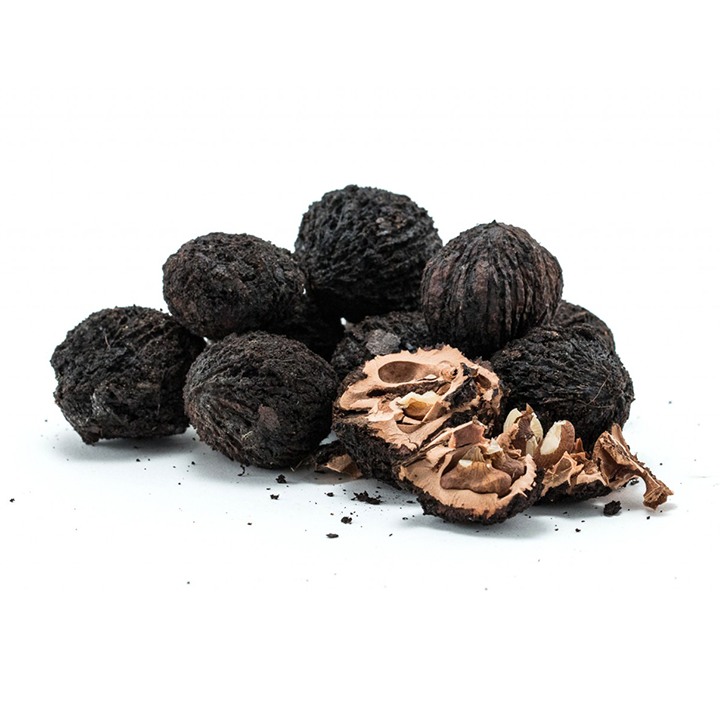Black Walnut
Juglans nigra L. – Juglandaceae

Walnuts are a group of plants belonging to the genus Juglans of the Juglandaceae family. One of the two most popular species is Juglans nigra L. or black walnut, which is native to North America (USA and Canada), but is now also common in Europe. As its name suggests, it is known for the dark color (brown to black) of the wood, but the hard-to-crack walnut shells make it difficult to use as a commercial source. On the other hand, English or Persian walnut Juglans regia L. is the most commercially exploited species as a food source. It is native to central Asia and parts of Europe, but has been widely introduced and cultivated throughout the world.
Walnut roots and leaves are known to be used as a traditional medicine for diabetes, rheumatism, fever, skin diseases and hemorrhoids. Walnut oil and other products are also common ingredients in dry skin creams, anti-aging and anti-aging product formulations. The seed kernel is known to contain polyphenols such as tannins. The high content of polyphenols in the walnut increases its antioxidant properties. It has also been shown that walnut has a hepatoprotective effect, and the carriers of this effect are polyphenols.
The health benefits of walnuts may be partially related to their high content of polyunsaturated fatty acids. Oil extracted from walnut seeds has over 76% polyunsaturated fatty acids. Of these, the most dominant component of walnut oil is linoleic acid (62%), the concentration of which can vary depending on the source of the walnut and the extraction methodology. In short, walnut seeds consist of oil that is rich in linoleic, linoleic and oleic acids. These saturated fatty acids are known for their health benefits, but their effect may be limited due to their oxidation. In addition to the content of tocopherols (relatively less content in walnuts than in other nuts) that can inhibit the oxidation of fatty acids, polyphenolic compounds are excellent antioxidants that protect both the fatty acids of the oil and human tissues when given as food and/or medicine. Although not investigated in detail for individual active components, the potential health benefit of nut (seed) intake in humans may be attributed to both oils and polyphenolic compounds.

Numerous epidemiological evidences provided for walnuts are also similar to the general cardiovascular, protective and health benefits of polyunsaturated fatty acids in the human diet where improvements in endothelial dysfunction and lipid profiles have been observed. Daily intake of 56g of walnuts improves endothelial function in obese adults, people with visceral fat. Walnut leaves have been used in the form of infusions and teas in the treatment of purulent and fungal skin lesions, pulmonary and other forms of tuberculosis, diabetes, diseases of the mucous membranes of the mouth and throat, vitamin deficiency.
Black walnut should not be confused with walnut. Although they belong to the same family, they have significant differences. For a long time, the medicinal properties of Juglans nigra remained unexplored. The beneficial properties and contraindications of black walnut largely depend on the composition of the kernel. Ripe fruits contain eight fatty acids, up to 30% protein and 7% carbohydrates. Juglone found in nuts is of great importance for health. The substance has antifungal, antiparasitic, antimicrobial effects, improves intestinal function, restores the mucous membrane. Juglone (an organic compound found in various parts of the plant) inhibits the activity of phosphatidylinositol-3-kinase, which indicates its anticancer properties. Juglone has a wide spectrum of antibacterial activity, both against gram-positive microorganisms (Staphilococcus aureus, Streptococcus mutans), and against gram-negative microorganisms (Escherichia coli, Pseudomonas aeruginosa), as well as against pathogenic fungi. The antibacterial effect of juglone and its derivatives against oral pathogens Porphiromonas spp, Streptococcus mutans, Actinobacillus viscasus, S. sobrinus, S. salivarius has also been proven. The complex of pharmacological properties of juglone determines its effectiveness in the treatment of various skin diseases.
Studies of antimicrobial activity were conducted in the laboratory of antimicrobial agents and high and moderate antimicrobial activity of walnut (Juglans regia L.) and black walnut (Juglans nigra L.) extracts was determined. Phenols, such as gallic acid, ellagic acid, ferulic acid and naringin, are associated with antibacterial activity. The mechanism by which phenols inhibit bacterial growth is proposed to involve disruption of membrane structure and/or inhibition of DNA synthesis.
